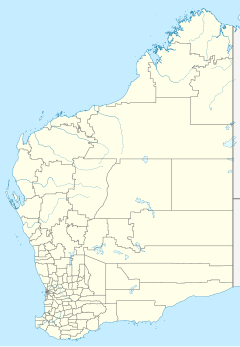Middalya Station
23°54′22″S 114°46′05″E / 23.906°S 114.768°E Middalya Station is a pastoral lease that operates as a sheep station in Western Australia.
It was located 132 kilometres (82 mi) south east of Coral Bay and 256 kilometres (159 mi) north east of Denham in the Gascoyne region. The Minilya River runs through the property. The traditional owners of the area are the Tharrkari people who currently lease and manage Ullawarra station.[1]
Occupying an area of 1,977 square kilometres (763 sq mi), approximately 1,655 square kilometres (639 sq mi) of the rangeland is described as being in good or fair condition. It is able to be stocked with 19,350 sheep with a flock of 15,200 being recommended. It is composed of sandplains, alluvial and stony plains and hills.[2]
In 1887 the property was stocked with 6,000 sheep which produced 87 bales of wool, by 1890 the flock had increased to 16,000 producing 220 bales.[3] J. H. Mansfield who had previously managed Karratha Station and later owned Maroonah Station was managing Middalya in the 1880s.[4]
Douglas John Hearman acquired Middalya at some time prior to 1897.[5]
Middalya was placed on the market in 1902, at this time it occupied an area of 600,000 acres (242,811 ha) and was stocked with 18,000 sheep with 40 cattle and 80 horses.[6]
In 1907 the property was hit by a severe storm and recorded 3 inches (76 mm) of rain in a short period of time. The homestead was damaged by strong winds and several windmills were blown over.[7]
During the shearing season of 1918 a total of 15,500 sheep were shorn including 3,000 lambs producing a total of 300 bales of wool.[8]
A flock of 15,936 sheep and 5,208 lambs were shorn in 1923 producing 525 bales of wool.[9]
See also
References
- ^ "Tharrkari – The People and their Traditional Country". Wangka Maya Pilbara Aboriginal Language Centre. 2012. Retrieved 10 May 2014.
- ^ "Station Reports" (PDF). Department of Agriculture. 1988. Archived from the original (PDF) on 5 November 2013. Retrieved 4 November 2013.
- ^ "Gascoyne Notes". The West Australian. Perth: National Library of Australia. 4 September 1890. p. 3. Retrieved 4 November 2013.
- ^ "Death of Mr. J. H. Mansfield". The Northern Times. Carnarvon, Western Australia: National Library of Australia. 27 April 1907. p. 2. Retrieved 4 May 2014.
- ^ "News and Notes". The West Australian. Perth: National Library of Australia. 20 October 1897. p. 4. Retrieved 7 November 2013.
- ^ "Advertising". Western Mail. Perth: National Library of Australia. 11 January 1902. p. 5. Retrieved 6 November 2013.
- ^ "Heavy weather at Carnarvon". The West Australian. Perth: National Library of Australia. 25 March 1907. p. 5. Retrieved 8 November 2013.
- ^ "Middlaya". The Northern Times. Carnarvon, Western Australia: National Library of Australia. 28 September 1918. p. 5. Retrieved 4 November 2013.
- ^ "Gascoyne Middlaya". The Northern Times. Carnarvon, Western Australia: National Library of Australia. 17 November 1923. p. 5. Retrieved 6 November 2013.

